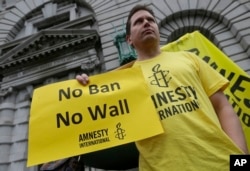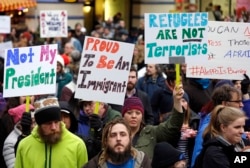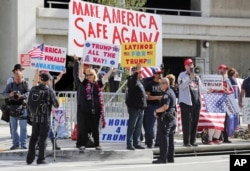President Donald Trump will soon release a "more streamlined version" of a presidential order banning immigrants from seven Muslim-majority nations, but it will be better implemented and avoid the chaos that resulted from an earlier attempt to restrict foreign travelers arriving in the U.S., Homeland Security Secretary John Kelly said.
Speaking at the annual Munich Security Conference in Germany, during a panel discussion on combating terrorism, Kelly said the new version of the travel order will not prevent foreign nationals with either work visas or "green card" permanent residency permits from re-entering the United States. Nor will it affect foreign travelers already flying to U.S. ports of entry when the order takes effect, he added.
Trump will "make sure that there's no one caught in the system of moving from overseas to our airports" during the travel ban, Kelly said.
The new immigration order could come as early as Tuesday, U.S. news reports suggested, and Trump himself has confirmed it will be issued during the coming week.
Courts blocked original travel ban
The original travel ban, which has now been set aside by U.S. courts, was issued January 27. It was a security measure meant to prevent attacks by Islamist militants, White House officials said. Trump's executive order barred entry to the United States for at least 90 days by people from Iran, Iraq, Libya, Somalia, Sudan, Syria and Yemen; it also excluded all refugees seeking resettlement in the U.S. for 120 days, except those from Syria, who were banned indefinitely.
The abrupt implementation of the ban, which was enforced just hours after it was signed, caught many officials and travelers unawares, leading to chaos and protests at international airports in the U.S. and abroad. Some people from the targeted countries were detained, and others were sent back to their home countries.
Federal judges who suspended the ban earlier this month ruled it illegally targeted Muslims on religious grounds and had been put into effect without due care or preparation.
The president said on Thursday he would announce a new, revised executive order on immigration during the coming week.
'Temporary pause'
Kelly, a retired Marine Corps general, said the original order was designed as a "temporary pause" to allow him to "see where our immigration and vetting system has gaps" that potentially could be exploited by attackers.
The new order will seek to iron out some of the difficulties in the version currently held up by the courts, he added. The homeland security chief is in charge of one of the largest government departments, supervising all customs, immigration and border patrol agencies the government operates, as well as the Drug Enforcement Administration, the Coast Guard, the U.S. Secret Service, which protects the president, and other security agencies that protect federal property and foreign dignitaries.
"The president is contemplating releasing a tighter, more streamlined version of the first (order)," Kelly said Saturday in Munich. "And I will have opportunity to work (on) a rollout plan, in particular to make sure that there's no one, in a sense, caught in the system of moving from overseas to our airports."
He said "it's a good assumption" that green-card residency permit holders would be allowed in, as they eventually were a few days after the original order.
Accelerated deportation hearings
The new order also aims to speed up deportations by denying asylum claims earlier in the process. The order will instruct immigration officials to only pass those asylum seekers who have a good chance of ultimately being granted haven in the U.S.
The order outlines plans for greatly expanding the categories of people that immigration agents target for deportation, and gives them wide discretion in deciding who to deport.
Previously, recent arrivals and convicted criminals were the prime targets. The new plan would include migrants who have been charged, but not convicted, of crimes, and would also apply to undocumented immigrants who have been in the country for many years.
Kelly is also calling for 10,000 additional Immigration and Customs Enforcement agents and 5,000 new hires at the U.S. Customs and Border Protection agency.
Same Muslim-majority states affected
For foreign nationals from the countries in question who already hold valid U.S. entry visas, Kelly said, "if they're in motion from some distant land to the United States, when they arrive they will be allowed in." The agency chief added, however, that there would be a "short phase-in period" to ensure affected travelers in other countries are not allowed to board airliners prematurely, to evade the travel ban.
A draft of the replacement executive order shows the administration aims to put restrictions on citizens of the same seven Muslim-majority countries covered by the initial order, according to The Wall Street Journal, which cited an internal State Department memo. Kelly also mentioned "seven nations" during his discussions in Europe.
The replacement order could be issued as early as Tuesday, the Journal reported, citing a U.S. government official.
Separately, the Trump administration also has asked the 9th U.S. Circuit Court of Appeals in San Francisco to withdraw its earlier ruling that temporarily suspended the travel ban, because a new, superseding order is about to be issued.
Focus on protecting the US
"In so doing, the president will clear the way for immediately protecting the country rather than pursuing further potentially time-consuming litigation," the Justice Department said in its filing.
Government attorneys have stated the Trump administration has the authority to institute a travel ban to protect the nation's security, and they have rejected criticism that restricting travelers only from majority-Muslim countries amounts to a ban on Muslims entering the U.S.
The U.S. Constitution forbids the government from establishing an official religion or taking actions that promote or inhibit religion. Trump's order specified that refugees who are a religious minority in their country and facing persecution would still be eligible for admission to the U.S. This would apply to non-Muslims from the seven targeted countries.
While campaigning for the presidency last year, Trump originally banning all Muslims worldwide from entering the U.S., but he later altered his plan to target countries with links to terrorism.
Some material in this report came from Reuters.








